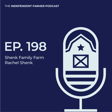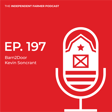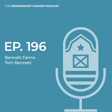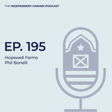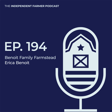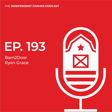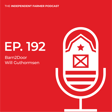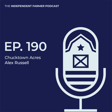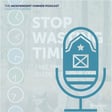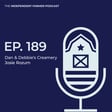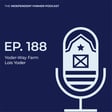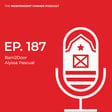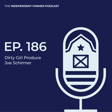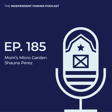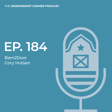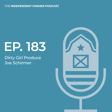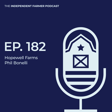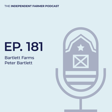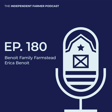Become a Creator today!Start creating today - Share your story with the world!
Start for free
00:00:00
00:00:01

The Hurdles of Farm Growth
Tom of Bennett Farms (MI) shares the challenges tackled (and overcome!) as he doubled his Farm sales… then doubled again in just 4 years. In this latest episode, hear Tom’s advice for Scaling your Farm Business.
For more Farm resources, visit: barn2door.com/resources
Transcript
Introduction to The Independent Farmer Podcast
00:00:10
Speaker
Hello and welcome to the Independent Farmer podcast, the go-to podcast for do-it-yourself farmers who are taking control of their own business, skipping the middleman, and selling direct to local consumer and wholesale buyers.
00:00:20
Speaker
This podcast is hosted by Barn to Door, the number one business tool for independent farmers to manage their business, promote their brand, and sell online and in person. Let's dive in to today's Independent Farmer podcast.
00:00:42
Speaker
Welcome to the Independent Farmer Podcast. I'm James, the Chief Operating Officer at Barn-to-Door and your host for today's episode. As many of our listeners may be aware, Barn-to-Door offers an all-in-one business solution for independent farmers who are cutting out the middleman and taking control of their own business, selling under their brand, and making sure their customers can access them anytime online and in person.
Challenges in Growing a Farm Business
00:01:03
Speaker
In today's conversation, we're going to be jumping into some of the hurdles of growing your farm business. And today I'm happy to welcome back Tom Bennett of Bennett Farms in Michigan. Tom is a part of our farm advisory network and he's worked with us for more than five years.
00:01:18
Speaker
Since becoming an advisor, he has shared many best practices for growing your business and marketing in person and growing a full-time farm business while increasing average order sizes. Tom's been incredibly successful and he's also a family man.
00:01:31
Speaker
I'm excited to talk to Tom today about the various steps he's taken to grow his farm business, some of the struggles he's encountered along the way, and some advice for new farmers. Welcome back, Tom. It's great to see you. Hey, thanks, James. Good to be back.
00:01:43
Speaker
Well, I'm really excited to dive into this, given, you know, watching the maturation of your farm over the years, you guys have really built a great business.
Tom Bennett's Farming Journey
00:01:50
Speaker
But for some of the listeners, perhaps who may be unfamiliar with Bennett Farms and your story, let's rewind a little bit and maybe give a little bio on your background, how you got into farming to begin with.
00:02:00
Speaker
Yeah. So did not grow up farming, had no background in farming. You know, the neighbors had a farm when I was a kid and we'd throw apples at their cows and stuff, but that was about the extent of it. So I joined the Marines 2001, right out of high school, spent 10 years in the Marines. And when I got towards like year seven, I started thinking about what I would be doing after the military service.
00:02:21
Speaker
And I knew I wanted to get some land and live in the country. And so we went that route, bought some land. And then when I transitioned to civilian life, started producing food for ourselves, just as more of a homestead type of deal.
00:02:34
Speaker
And then we had seen demand from people we knew around us that started asking us if we would raise hogs for them and do things for them. And then we kind of said, well, maybe there's something here. Maybe we should formalize this a little more.
00:02:45
Speaker
Started selling bulk animals that way. By 2012, I was raising a livestock, mostly, you know, starting out with chicken and pig, things like that. And then by 2016, I did my first farmer's market, still working an all farm job, had some success with that and saw the potential to replicate that and, you know, just to do more of those to provide more income.
00:03:07
Speaker
And then by 2018, we had grown that big enough that I had to decide between scaling back on farming or going all in on it and quitting my day job because we just ran out of hours in a day, you know, to do everything. So went all in on farming in 2018.
00:03:23
Speaker
That would have been about the same time we started with Barn to Door. I believe that was like the same yeah quarter of the year when I said, okay, if I'm going to do this for a living, though, I definitely need an online avenue as well to capture more customers. So Yeah, it's been great. It's been a ride.
00:03:38
Speaker
I mean, it exceeded my hopes and dreams from the beginning when this started. And I was just laying in bed with my wife saying, you know, I think I can do this. Like if we just raise this many animals and, you know, she brushed it off, just kind of like, yeah, yeah, right, right. You know, OK.
00:03:51
Speaker
And then here we are, you know, surpassing all those goals, you know, less than 10 years later. So, wow, that's amazing. I have to tell you, I remember talking to you. I think we met at the Farmers Veteran Coalition Conference, actually. And at the time, like you said, you were working an off farm job.
00:04:06
Speaker
And for the listeners who don't know this, you also have six kids, right? Like, so you got a lot of mouths to feed, right? You still have a heavy load, but at that point you had a very heavy load on your plate and trying to make this decision, especially as a, you know, providing for your family.
00:04:19
Speaker
Talk about making that transition because I know a lot of people still working on farm job and try to make that switch. And that's really tough. Yeah. And I got some great advice on, you know, I've tried to, on that question that I get sometimes I try to distill it into an easy answer for people on how do I know when it's time to make the switch? And I haven't said this on a podcast yet because it kind of just came to me a month or so ago.
00:04:41
Speaker
There came a point when I was working my off farm job and farming where By going to work at my off farm job, I, in effect, lost money that day because I missed out on opportunities with the farm. Like I would go to work to make 300 bucks, but lose 500 because I wasn't able to do a delivery route that day. Or maybe, ah you know, I had six pigs farrowing that day and I had to walk away from it because I got to go to work.
00:05:08
Speaker
and I lose thousands of dollars worth of pigs. you know When you start to see that you could make more money by staying home than you would have if you went to work today, that's when it's definitely a time that you need to you know take a look at that about stepping away.
Managing Farm Growth and Risks
00:05:21
Speaker
And that starts happening consistently more and more as you grow. So that was the tipping point for me was where I was just tired of losing livestock, you know death losses. I've had thousands of birds on pasture.
00:05:34
Speaker
Got to leave for work during a thunderstorm and couldn't take care of, you know, what I needed to there. So I go to work to make my wage for the day, but I lose thousands of dollars in birds that I could have prevented if I'd have been home or, you know, missed opportunities with, I couldn't do a Thursday delivery route because, know,
00:05:50
Speaker
You know, I had to work on Thursdays and the restaurants that we deliver to you know, they don't want an evening delivery. They want a morning delivery. So just things like that. it was a hard transition. Like the risk is all financial, right? I mean, that's what it really comes down to.
00:06:06
Speaker
And my wife had said to me when I left my employer that I was with, like, you can do this. She didn't fully support it. All right. So because we had a comfortable thing going, you know, life was easy.
00:06:18
Speaker
And she said, you can do this, but your paycheck next week better not be less than it was last week. Yeah. You know what mean? Like, so from day one, we had an understanding that I could do this as long as my family did not suffer for it. You know, I don't want my kids to go without. I don't want us to have less because I want to chase my selfish, you know, thing in life that I want to see us do.
00:06:42
Speaker
So, and we succeeded at that. Life's changed a lot since then. It's nice because, I mean, with the success that's came now, it's like the financial obligations in my real life are laughable compared to the financial obligations that the farm has. I mean, we spend $2,000 on milk just from an Amish dairy that we resell.
00:07:05
Speaker
You know, I mean, ah that's more than my mortgage. You know what I mean? And that's just one side item that we carry in our online store and we offer for delivery. So that's not even a product that we produce. That's just an add-on from another farm. So we're in a lot better place now financially because we were able to take the risk early on, you know?
00:07:27
Speaker
Yep. No, no risk, no reward, right? Like it is a transition. And I know many farmers who are listening to this podcast right now want to get into that position, that that enviable position, like you said, where you can begin, where you've built loyalty, built brand, you've got a customer base big enough now that you're now acquiring additional products. This is add on margin, add on revenue to even add more value for your customers. And that's the really great position. Took a lot of hard work for you to get there. Yeah. let's back up a little Let's talk about some of the steps it takes to get there. So First off, your core products, you mentioned pork and chicken.
Product Differentiation and Market Strategy
00:08:01
Speaker
Talk to us a little bit about how you chose those items initially and, you know, kind of little bit about your commitment there in terms of your practices and the types of products you're raising. Yeah, pork and chicken was our go-to from the beginning. We knew we had to differentiate ourselves like in the market, right? Because if I'm going to sell the same confinement products,
00:08:18
Speaker
CAFO operation meat that Walmart's selling, why would they want to buy it for me? I'd be local, but it would be a similar product. So in order for us to get a premium on our product, we needed to be able to differentiate ourselves in the marketplace. So we are pasture-based, non-GMO and antibiotic-free.
00:08:34
Speaker
To this day, even with everything, we don't have a barn on our farm. We've got some brooders, but aside from that, we have no barn. So everything's, you know, the pigs, chickens are actually, we're running them all the way into January now and then starting them in March.
00:08:49
Speaker
ah So we started out with pork and chicken, mostly because it's a quick turnover, right? We need to be able to turn over that cash to get money back in as quick as possible. Chicken's got an eight week life cycle.
00:09:01
Speaker
It's very fast. And if you need to grow with chicken, You know, you can do that quickly. You don't have to wait for another season to start to do more. but You can always add that on. It's only eight weeks away from being in stock.
00:09:14
Speaker
Pigs are the same way. We saw them as being a pretty quick return as well. You're looking at six to eight months, depending on if you're buying feeder pigs or breeding them. And the margins were good. So we started out with that and we grew the pig and the chicken thing to substantially large numbers.
00:09:30
Speaker
We wanted to get into beef. But frankly, we just couldn't afford to make that long-term investment in beef in the early years because all of our capital was going back into raising more and more pigs and chickens.
00:09:42
Speaker
As we were doubling every year for the first at least four years, four five years, we're not quite doubling anymore. We're growing at about 30%. And that's because doubling a lot of people don't realize it it is financially burdensome because you're taking if you let's say you make a 50 profit margin okay let's just use that as a example number it would take all of your profit to double if you just reinvest that back in next year just in the livestock inputs right so the first several years it's like we're doubling we're doing more and more volume
00:10:16
Speaker
But we didn't really get to capture a lot of those profits because we were growing. So now it finally feels good to be able to grow at like 30% instead of doubling, because then we still have, you know, a 20% margin to work with on, you know, getting more delivery vans. We finally got our first tractor on our farm, like a loader.
00:10:34
Speaker
ever about two months ago. So that's been real nice. So pigs, chickens started out with that. Then we went into turkeys, obviously started doing turkeys mostly for Thanksgiving. Still once a year, we'll do about 700 of those for Thanksgiving.
00:10:47
Speaker
And now we're growing a beef herd and beef is awesome because there's no input cost on that. I mean, I spend, you know, a thousand dollars a day on pig and chicken feed, but I spend zero dollars a day on beef feed.
00:10:59
Speaker
I got to manage your grass and pastures well, right? So assume that you're in a good rotational grazing plan. Yeah, we're management intensive grazing. So we small cells moving them every day. I mean, in the winter that goes out the window because we eventually run out. So right now we're waiting for the spring green up to start. So right now they're on hay that we just buy in hay, but they'll be out on rotational pastures again soon.
00:11:22
Speaker
But beef's a time thing, you know, it's a time investment, not so much a input cost. Now you mentioned early on, you know, why would people want to buy from you versus Walmart if you're selling locally, right? A confinement product.
00:11:35
Speaker
So you're not doing that. You're selling a premium product, grass-fed, pasture-raised, non-GMO, as you mentioned. But let's talk a little bit about the channels that you're selling to. Are you still trying to focus in on locally? Like, I know you are also at farmer's markets. You saw it you mentioned some restaurants too. Like, what's your customer mix and what's your kind of target radius that you're looking at?
00:11:54
Speaker
Yeah, our customer mix is 97% direct to consumer, either via our online store or through one of the 29 farmers markets a week we do. We did 29 a week last season, and we're also going stick with that again this year and do 29 again.
00:12:10
Speaker
This season. And that's where a bulk of our product goes. We do do some wholesale to restaurants and independent like organic grocery stores. We don't aggressively pursue them still. Those are just ones that have reached out to us via like Instagram, wanted to carry our product. So we just add that those stops and into our Tuesday and Thursday delivery routes. So it's just like a residential stop for us. It just gets added on.
00:12:35
Speaker
So yeah, we're not too heavy into wholesale yet. There's so much more room to grow there. I mean, I know guys that built their entire farm just on wholesale accounts. You know, that's not us. right now ah you need lots of volume small margins and then you know you get stuck with some big wholesale accounts and all they got to do is you know miss an order for one week and it kind of throws your world upside down so it's like during the whole covid issue when everything shut down i was doing just fine you know it was some of the farms that were like all in on wholesale they were up a creek
00:13:09
Speaker
Because they had no market to sell to They didn't have, I mean, I've got 60,000 individual customers per year. I might lose a few here and there, but I'm always gaining more than I'm losing. You know, if people move, things like that, stuff happens. so It's really hard to lose 60,000 customers at once. Yeah, the resilience you have in your business by having such a diversified and wide customer base is just, again, versus a few wholesale contracts, right?
00:13:36
Speaker
Again, you're not putting yourself in any form of jeopardy, plus you have full control on your pricing, right? Which is fantastic. Let's talk a little bit about you mentioned delivery routes a couple times. So you have farmer's markets.
00:13:48
Speaker
I assume, can people pre-order for pickup at the farmer's markets? And then talk to me about delivery, because I'm very curious about that as well. Yeah, so they can pre-order for pickup at the farmers markets and then they can also choose from delivery. So when they add an item to their cart, the first thing you'll ask them is this for delivery or pickup. They just pick which fork they want to go down.
00:14:06
Speaker
And they can do it either way. So we have to constantly update our farmer's market pickup availability on our online store because markets change throughout the season. So we need to keep that up to date. know, I had people call me yesterday, Hey, I'm trying to pick up for Wicker Park tomorrow. I don't see it on the website.
00:14:20
Speaker
I'm like, that's because there is no Wicker Park tomorrow. It's a skip week market. It's not, they're like, Oh, you know, so our pickups on our site are that accurate that if they tell me that they're not seeing it on there, I can tell them with confidence it's because that market doesn't exist tomorrow.
00:14:33
Speaker
So they can do it that way or home delivery. We've got home deliveries going out tomorrow. I just printed off 162 pack list orders for tomorrow's deliveries. Wow.
00:14:45
Speaker
And so that's what we're doing today is building those routes.
Improving Farm Management and Efficiency
00:14:48
Speaker
My... Barn office managers building the routes. I'm kind of, it's funny. You said you were talking earlier about how hard work it was.
00:14:55
Speaker
I actually within like the last six months. but So we are busier than we've ever been. But by hiring key people like livestock managers and office people, I've actually never felt Like I had less on my plate than I do right now, you know, because I'm able to delegate so much of this once we've grown enough that I can afford to pay people to do these specific, you know, areas of our farm.
00:15:19
Speaker
And it frees me up for a lot more mental capacity to like look at the big picture instead of just like nothing burns me more than me out there. feeding chickens when like this could be done by someone that doesn't need you know it's good to do that once in a while because you learn a lot and like i'm the master of chicken health i've seen it all i've done it all but i'm at a point now where i can't get bogged down doing 15 an hour jobs because i need to be doing hundreds of dollars an hour jobs you know in my head in the office yeah you need to be working on the business not in the business exactly and we finally reached that point and it's really nice
00:15:55
Speaker
I was say with respect to delivery, do you guys charge a fee for that? Or is there a threshold of which delivery fee free or like, how do you structure your delivery route? Yeah. On our subscriptions, we do a free delivery.
00:16:06
Speaker
So any of our subscriptions that we offer that's free delivery, that's kind of like the bonus for them to sign up for that is that they get free delivery. And then we make sure they know that like, Hey, also, if you want to add on things like just make sure that you select the same delivery date as your subscription.
00:16:21
Speaker
And you'll receive free delivery on those Alcart items as well, because we're already coming there with free delivery for your subscription. So we do charge a delivery fee on our normal orders up to a certain threshold. I think we still have it at $75. And I know a lot of farms are like, that's crazy. You know, ah we charge whatever, like customers would pay the delivery fee.
00:16:41
Speaker
Our delivery zones are so dense, I guess I can put it that like, it's really, it's not a lot. We're going... three houses down in some cases, like in Chicago. You can deliver multiple stops from one park spot, you know, or there's three customers in the same condo.
00:16:57
Speaker
So our deliveries are dense enough that we're not driving long distances for single stops. And typically, even the people who get free delivery, there's a tipping option on there for the farm. And I mean, they'll get the free delivery or use their $5 coupon code because they're first time customer. And then they'll leave a $20 tip. It's like, well, honestly, they don't care about the you know saving five bucks. So that's cool.
00:17:20
Speaker
But yeah, our delivery fee is $6.95. If it's under $75, unless you have a subscription going with it. I know here in Nashville, I pay $15 for our subscription box to get delivered once a month. Right.
00:17:33
Speaker
But like you said, I don't really care. Like I'm more interested in supporting the farmer and making sure that they can pay a wage to their delivery driver. right Yeah. And I mean, I don't like paying delivery fees. If I go to a website for Best Buy and they want to charge me a $20 delivery fee for a TV, I'll just go to Amazon and buy the same TV for the same price and get free delivery.
00:17:52
Speaker
You know, i mean it's psychologically a lot of people are looking for that expectation of free delivery nowadays. And we're not making our money on delivery fees. You could even go as far as just price your meat a little bit more and build it into the cost of the meat and then give a free delivery at a lower threshold. I don't know. I'm not saying that everyone should do that. Charge as much as you want for delivery.
00:18:11
Speaker
But we were more concerned with volume and we wanted to get the volume up and build a bigger customer base faster. And I felt like, you know, making delivery more accessible was a good way to do that.
00:18:24
Speaker
Yep. When I love the incentive for, Hey, if you're making a one-time purchase, you yeah, it's 695, but if you sign up for a subscription, you know, we're going to bring to your house for free. And as you said, there's just this beautiful add on capability, just be able to, Hey, great. Let's add some milk to that order. Right. Yep.
00:18:39
Speaker
And they do too. Yeah. They flood in with orders right a couple days before the subscription day, adding on stuff. So. That's great. What do you feel like has been one of the biggest hurdles you've had from moving from a hobby to a full-time farmer? right like How are you managing your time?
00:18:55
Speaker
right Yeah, i kind of have a list of some hurdles that I think people will encounter with growth in a farm. So one of the most important things that I think is a huge hurdle to people's growth of their farm is that, you know, they'll spend 90% of their time planning and never taking action.
00:19:13
Speaker
You know, sometimes you can't wait to be 100% ready to do something before you do it. You just got to jump in and learn how to swim while you're drowning. and That's how I go at things. And I get way more accomplished than people I know because I'm not afraid to just learn as I'm doing it.
00:19:30
Speaker
You know, you can read as many books as you want that people plan, plan, plan, and they never actually get around to doing before the idea dies. So I would say one of the biggest hurdles to growth is yourself.
00:19:42
Speaker
That sounds a little bit like getting married or having children, right? Like nothing prepare you for it, right? You just have to jump in and trust God's got a plan ultimately, right? Yeah. Yeah. I'm 41 years old now, and I still can't believe that I'm a parent.
00:19:54
Speaker
And I've been parent for 20 years. So it's like, i this shouldn't be allowed. yeah I still don't feel like a grownup. So another another big hurdle that people have faced, kind of the nuts and bolts of it,
00:20:08
Speaker
You're going to face cold storage issues, right? Like if you're a meat farmer, that's going to be one of the first things that slaps you in your face is that I want to produce all these pigs and chickens, but I have nowhere to put them. So what people end up doing is, is that they're just producing as much as they can hold in their chest freezers and then they're selling it and then they're out and then they're selling You need cold storage capacity, right?
00:20:29
Speaker
Because then you can produce more when the weather's good, you know, and put that away for the off season, like to carry us through the winter. You know, a lot of my savings is actually in the form of pallets and pallets and pallets of meat that's ready to be sold, you know, going into the winter. So cold storage, you're going to want to find a regional cold storage facility near you. If you start getting into like, you know, you're doing thousands of chickens at a time,
00:20:56
Speaker
We have three walk-in freezers here on the farm and we keep those stocked with what we'll need each month. And then as we start to run out of stuff, we can just go to cold storage and pick up pallets of chicken or whatever to restock that. But cold storage is pretty affordable.
00:21:10
Speaker
That'll get rid of one of your big bottlenecks in the beginning. Yeah, I think that'll help people. And we got up to like 18 chest freezers at one point and it just wasn't manageable. Like it's, it's silly.
00:21:22
Speaker
So give some walk-ins off Facebook Marketplace or Craigslist. You can get used walk-ins all the time, especially when the economy has a downturn and restaurants start going out of business. Walk-ins are cheap, like $1,000 for a 12 by 12 walk-in.
00:21:36
Speaker
Yeah, you can get a pretty good deal on them if you watch for it. So another one of the the things that I would see is that one of your hurdles to growth is always going to be your time too, right? Like we've only got 24 hours in a day. So no matter how rich you are, how poor you are, no matter where you're at in life, me and you both get the same 24 hours. So it's how you manage that 24 hours that'll decide the course, right?
00:22:02
Speaker
of the rest of your life. So when it comes to growing the farm, I did it almost all myself in the beginning because one, I needed to provide that wage to me.
Hiring and Sales Strategy for Farm Growth
00:22:12
Speaker
And two, I didn't trust anyone else to be able to do it as good as I was doing it. I was worried that I wouldn't be able to keep them employed, you know, through the slow part of the season, things like that, and have the burden of that payroll on me then.
00:22:24
Speaker
But one of the things that you can do is hire salespeople, right? Like salespeople are free hires because they are expected to generate more profit for your farm than you're having to pay them, right? So market staff is how we grew our farmers markets.
00:22:41
Speaker
Up until last year, I was still doing markets during the week just because I was the fill in for if somebody didn't show up to work that day. Because on some days we have nine farmers markets going at the same time. So it's a lot of people.
00:22:53
Speaker
But hire people to represent you at you know markets or if whatever your sales channel are. Maybe you got one person that you're paying them a commission to go out and get restaurant accounts. you know And they earn a set amount of that commission off that reoccurring restaurant sale every week while that person works for you You know, so you could do incentive based salespeople to work for your farm that maybe want to do it, you know, freelance part-time or whatever they can be.
00:23:17
Speaker
So salespeople, they're always going to make more money for you than they cost you. So those are easy hires. And that's pretty much what we hired in the first few years. I wasn't hired. Was that the first hire was salespeople to to man the booth for you?
00:23:31
Speaker
but Yeah, those were the first hires for like five years. Like I didn't get my full-time like livestock managers until about two years ago. That's when I started releasing some of that to other people. So now we have three, one livestock manager, two farm hands and a barn office. we call her like a market sales manager. She basically just works in the office and packs orders and schedules, you know, markets and everything. So Vehicle utilization is going to be huge.
00:24:01
Speaker
So if you, if you, at first, when you start out, just use your own vehicles. Don't be embarrassed to deliver in your minivan or your Toyota Corolla. I did it. I was delivering and and Nissan Altima at in the beginning, you know, people, they kind of expect it from a small farm, really. I mean, they're not expecting you to pull up in a box truck or a transit van. They know they're buying from a little farm. So it kind of has some wholesomeness to it as well. You know,
00:24:24
Speaker
But once you do start bringing on vehicles, we make sure that we fully utilize those vehicles, right? Because they're expensive and you don't want to have them just, you know, we paying insurance and things on them every month and not keeping them moving. and So with farmer's markets, we'll load up to three markets in one van and they'll drop a trailer at the first one. They'll drop another market set up at the second one. And then the driver goes on and does the third one and then picks them up in reverse order.
00:24:49
Speaker
Those same vans are used on Tuesdays and Thursdays for deliveries and and things like that. got it. And do you have signage on your vans, QR codes, all that good stuff? I don't. You know, I wanted to, but to wrap all our vans would have been like $10,000.
00:25:02
Speaker
And it would have been really good advertising. i mean it was many miles as we put, I bought but transit van last June and it's already got 75,000 miles on it. And that's only one of our four delivery vehicles. Like it would be a really good utilization of billboard space, but two things. One, it was expensive and I could spend that $10,000 on beef, like stock or cat. You know, there's always something else that seemed like it was more important than vehicle wraps.
00:25:26
Speaker
And two, quite frankly, sometimes I'm glad that these vans don't have my name on them because I got staff driving in Chicago and like if they cut somebody off, I don't want them to like piss people off or anything. So it's kind of like we're in incognito mode out there on the road. So no, they're just plain white delivery vans right now. I do want to put Bennett Farms stuff on them, but I don't want to go halfway either and just stick on some lettering. I'd like to do something that's like a full representation of our graphics and everything. So We will get to that.
00:25:58
Speaker
But when we do get to that, we're going to have a big conversation with all of our staff about, hey, Like this is customer service now when you're driving, like, you know, like you're you're letting people in, you're not running red lights. You're not being a jerk, you know?
00:26:11
Speaker
So it's- You're representing the brand now. Right. Yeah. So we haven't wrapped them yet, but we do want to, but still, I mean, we're always finding other things. I like to spend money on things that are going to make us more money. And I do think that that would be one of those classifications of items.
00:26:27
Speaker
I just asked that question because I know many of our farms who do delivery find that they'll get, you know, five, six, 10 signups just off of QR codes in neighborhoods. Like you said, when they're doing deliveries, cause they're stopping the van and everyone else has seen the vans like, oh, that's a local farmer.
00:26:43
Speaker
If they're getting food, man, maybe I can get on that pickup route, right? Quite simple. Right. So I agree. And maybe that'll be my takeaway from this today is putting that back towards the top of my list. It has been on my list. There's just always something else that seems more important.
00:26:55
Speaker
You should talk to Lacey. I know they do quite well over at Taggy's, you know, she's another farm advisor. I know they do that quite well. Talk to me a little bit about how you got your initial customers. You know, you talked about the 60,000 you have now.
00:27:07
Speaker
What have been the best avenues to attracting, but more importantly, keeping those customers engaged? Like how do you capture their information and stay in touch with them? Yeah. So our primary, you know, I'm a one trick pony and that is
Customer Acquisition and Revenue Strategies
00:27:21
Speaker
farmer's markets. So it's like, that's where we built our farm. I'm sure there's other ways to do it, but that is how we met and meet and continue to meet all those customers and build new customers.
00:27:31
Speaker
I think that's where bulk of them come from. That's where we collect emails. That's where we're able to hand out our flyers to tell people to go shop online. So every single customer that we talk to at a farmer's market, we're giving them a flyer to our online store and explaining to them that we have subscription options and things like that. So even if they don't buy anything from us, it was not a lost opportunity on, you know,
00:27:52
Speaker
letting them know what we can provide them. And so we've built a lot of that through the farmers markets. And then that's huge for us because that builds the traffic to our online store and the the awareness of it. So that way in the winter, when everything shuts down, cause we're in Michigan, we still have that reoccurring revenue throughout the winter to get us back to the summer market season again.
00:28:15
Speaker
Got us So you're using the markets effectively as a funnel to acquire new customers and then market to them on an ongoing basis. Yeah, it would have been a lot slower growth for us had we not done that. i'm pretty sure.
00:28:26
Speaker
Yeah, I'm certain of it. Talk to me a little bit about streamlining your processes, right? Like you started working with us over five years ago. And what are one or two of the things that you found most helpful? i mean, you mentioned subscriptions a couple times. I know I've heard this from other farmers too, just the recurring revenue. Has that kind of been one of the big things for you?
00:28:43
Speaker
Yeah, the recurring revenue is huge, especially coming out of winter. Like this is probably this month and last month are probably the two hardest months as a direct consumer farm in the north when you're doing meats.
00:28:55
Speaker
Because you have huge outlays of capital for production. Like we're at full production right now, like feed, livestock, like chicks, all that stuff. But yet we don't have the income yet from those things until, you know, May and June.
00:29:11
Speaker
So The online stores is really big because it cash flows all that, you know, it gets us through those leaner times. As far as streamlining, we've just gotten better at processes as far as, you know, packing orders, managing inventory.
00:29:26
Speaker
You said you have an office manager. What is she helping to do to help make it simpler, easier for your pick, your pack crew, or for just being able to manage all your inventory? I mean, she's doing everything I used to do. so She didn't like invent anything new.
00:29:41
Speaker
You really, you just go to your online store, you download, you know, the upcoming orders for right now she's doing Thursdays. So we switched our cutoff time. We used to have our cutoff up until 6 PM the night before delivery day.
00:29:52
Speaker
And that worked when we were smaller. Cause I could just come out and pack three orders, you know, that came in after the cutoff before the morning. But now that route is so big that it takes,
00:30:03
Speaker
a large portion of the day just to do the routing because we have to build four different routes and balance them and then, you know, lay out all invoice staple customers who got multiple invoices together. And so we finally pushed that back a couple months ago to two days before the cutoff. And that's been huge because now we have all day Wednesday to build those routes instead of trying to do it on Wednesday night after 6 p.m.
00:30:25
Speaker
Got it. So that helped streamline some things. Now with the size of your business, you know, it's one thing to double when you're small, but now given your size growing 30% is even probably, you proportionally, well, it sounds smaller.
00:30:40
Speaker
The realistically it's actually a much bigger amount of growth versus when you were small. So how are you handling that ongoing growth as a business? Right? because Like you said, there's no additional hours to gain in the day.
00:30:52
Speaker
How are you scaling? What are you finding are the most beneficial investments you're making between people and or perhaps software to help you scale your time? So, yeah, a couple of things. One, you know, when people think of scaling, they think of like, you know, making bigger.
00:31:07
Speaker
When I think of growing this, I look at it more as a replicating, right? Instead of scaling. So we're taking things that work in small batches and instead of making them big batches, we're just doing a whole bunch of small batches still like with growing chicken and things like that. So it's more of a replication of what worked when it was small. We're still just doing the same thing, just times 10.
00:31:29
Speaker
you know, 10 more people to do 10 more things to do just because we made profit, you know, with that unit being like it was. So now we just do a lot more of those units, you know, whether that be farmers markets or animals.
00:31:42
Speaker
People are the best money I spend all week, right? They're like, I tell my livestock manager, like, you are the most expensive tool that I own. that I buy, you know, like, like, so they've got to be productive, you know, you guys have got to generate more value for me than you cost me to be here, you know, and they know that and we do things with them, like our livestock managers, like we have a profit,
00:32:07
Speaker
It's not even a profit sharing, it's a revenue sharing with our full-time farm staff that have been here for more than a year. So like Owen, he's my livestock manager. He's amazing. And he knows that the salespeople, the sales staff that come in you know to go out and do markets, they get all the glory and They're nice and clean. they're not doing the hard work in the trenches like he is.
00:32:26
Speaker
But I wanted him to also have some ownership of the farm, like some buy-in, you know, so that way he can feel good when he sees that we're loading up all these cattle to go to the butcher or the chickens or whatever. So I give him a gross revenue percentage. It's very small. It's... so One quarter of 1% is what we started it at because I'm like, man, if this could get out of control fast, like with the way we've been growing. So we did it as a test, give them one quarter, 1%. And now we have multiple people that get that.
00:32:53
Speaker
And so that way it really gives some buy-in from him, right? So he cares. Our sales staff at the markets, they get a base hourly wage plus a 5% sales commission on their gross sales for the day.
00:33:03
Speaker
And that that kind of buys their buy-in on the whole thing. At the very beginning of this podcast, you mentioned you're selling milk now from another farm, right? So you own the customer base.
00:33:14
Speaker
Talk to me a but little bit about, you know, making money off of other products now that you can just source and just pass through and make margin on it, given you've got the customers. Yeah. So as Bennett Farms, we produce and raise all of our meats. Like that's all us. That's what we do. So with the pork, chicken, beef, turkey, you know, those things, that's all on us.
00:33:33
Speaker
So one of the best things we were able to do to capitalize on like our success and the growth of our farm, right? Once you get to a certain size and you have this huge customer base, it is like free money to sell them other products from other farms that we didn't have to do anything to produce. Right. So we're already going out on these delivery routes. We've already got this huge customer base.
00:33:54
Speaker
And so we partnered with Amish country dairy, years ago. And now we buy like from them, as I said earlier, about $2,000 a week worth of milk in the winter.
00:34:05
Speaker
Like this is even the summer and we're making, you know, 35% margin on that. But all of that's free because we were already going to these places. And frankly, sometimes some of these customers may have came to us because they could get the milk delivered to their door and now buying meats. So we can't even see what the real,
00:34:23
Speaker
net positive is of that because it's hard to fish out, but it's just, it's super easy. And so we do that. We don't offer lamb. We have no intentions of producing lamb ourselves, I should say.
00:34:33
Speaker
So we partnered with another farm, Tiger Valley Ranch out of Southwest Michigan, and we're selling their lamb now. For them, there's really good margins on lamb and self admittedly, they are not great salespeople, but they're great at raising lamb.
00:34:46
Speaker
So I'm carrying their lamb with their label on it and that's, you know, helping their farm. And it helps us just because it puts more stuff in our store for our customers to have options. What a blessing. That's just great.
00:34:57
Speaker
Because ultimately, you know, you're just increasing your share of the wallet. It's not like the families you're selling to aren't going to buy milk. They're still going to buy milk. So why not make it easier? You run in delivery to them. Now you just made yourself stickier, right?
00:35:09
Speaker
So they're going to want to stay with you because of the convenience of all those things. And the margin's got to be attractive, like you said, as well, right? It's just additional money. Yep. Yeah. Or it works out really good. Anytime you can create, you know, more profit from something that like you didn't have to exert any time into with the exception of the delivery, like it's a no brainer, you know? So look at maybe partnering with other farms around you that compliment something that you're not selling, you know, it can make sense. So.
00:35:37
Speaker
That's great. Well, looking back over the last 10 years, is there anything you wish you knew or anything you would have done differently knowing what you know now?
Overcoming Personal Challenges in Farming
00:35:45
Speaker
Don't be afraid in the beginning. If you feel an imposter syndrome creeping up on you because you know in your heart that like you've never been a farmer and now you're farmer Tom, you know, you may feel that for the first couple of years. I felt it because here I am, like never been a farmer before trying to sell people chicken and now I've only been a farmer for a year, you know, at that point.
00:36:05
Speaker
And so I think the imposter syndrome where you feel like maybe I don't belong, like am I really a farmer in the beginning? Like, don't worry, that goes away. I think we all felt it especially when you start to feel success in the beginning.
00:36:16
Speaker
And it's kind of like, just keep going and eventually you'll fill that role that people visualize you as, I guess. I would say another thing is, you know, I touched on the beginning, don't be afraid or scared to try something before you're completely ready for it.
00:36:31
Speaker
That's how you got to go about these things, especially in farming. I think you can't study stuff to death. you Just got to, you know, make sure the numbers work and make sure that you've proven it out, you know, on a small scale.
00:36:42
Speaker
And then you can Grow with that schedule all of your butchering a year in advance. I hear people on connect calls. they're like, Oh, I just can't get any butchering spots. Well, it's because I probably took them all back in December, you know, so use your off season time to call and set up all your butchering for the year, right? For your chickens, your pigs, your beef, and then produce the fill those slots, right? Don't just produce the animal.
00:37:06
Speaker
And then worry when it's time for slaughter about finding butchering dates. Like you're putting yourself in a bad spot. I schedule all of my 2025 livestock have been scheduled since December 2024.
00:37:18
Speaker
so Now I just have to make sure that I have enough animals to fill those. And we always do. But yeah, schedule your butchering stuff a year in advance. Cash flow will kill you. That will be the death of your farm.
00:37:32
Speaker
If you have problems on a small scale, you better fix them before they become problems on a big scale. because you can't just grow your way out of a bad situation, right? If it's a bad situation at a thousand, it's going to be something that sinks your life at a million, you know? So figure out your margins, figure out what's profitable, what works, cut the stuff that doesn't.
00:37:58
Speaker
Don't be afraid to say no to customers on things. They will eat up your day with their special requests and odd stuff that just, it's like, ain't got time for that. I mean, yeah learning to say no is probably one of the most liberating things you'll ever do in life. And I'm a people pleaser. Like I wanted to say yes to everything and everyone, especially in the beginning, because every customer,
00:38:20
Speaker
Like, gosh, I was just fighting for every one of them. So they would ask me off the wall stuff. Like, can you just bring half my subscription this week and then half next week? Cause I don't know. Now I have no problem saying, no, we don't do that. It comes once a month. Yeah. know Sorry.
00:38:34
Speaker
I can't hold that mental space in my head for five minutes a month to give to you. So that way you don't get any medium eggs in your dozen when it comes. Like it's not doing that. Like,
00:38:45
Speaker
yeah People, they'll text or they'll message me about, Hey, I have a delivery scheduled for tomorrow or i have a delivery schedule for next Tuesday, but I was wondering if instead you can just bring it to the market tomorrow or whatever. I'm just like, cause they think they're saving me time. And I'm just like, no, not really. I'd rather not, you know, sometimes I can change stuff like that, but it would be like calling Amazon and saying, Hey,
00:39:13
Speaker
I just want to pick up my order at the fulfillment hub. I know you guys were going to bring it anyways, but I'm going to save your driver, you know, a trip to my house. Let me just get it from the fulfillment center. Like that would screw up Amazon world, right?
00:39:24
Speaker
Well, it doesn't screw up my world, but I've got a lot going on. And like you just robbed me of 10 minutes of mental capacity for something that you thought you were helping me on, but you're not like, let us just deliver it, you know, because we're already there. There's a software and a process that puts all this stuff in order.
00:39:44
Speaker
That's how we mess stuff up, you know, is when we pull stuff off from what was supposed to be delivery and then just hand it to somebody instead somewhere else. And so I say that stuff, too. That's great. You run the business that works for you, right? For you as a farmer. Yeah, you can't placate all these individual requests.
00:40:00
Speaker
Well, I want to be respectful of your time, Farmer Tom. I like calling you Farmer Tom. now you You coined it. That's great. Let's wrap up with a little bit of an outlook. What does the future hold for Bennett Farms? You know, you guys have been at this for some time.
00:40:12
Speaker
What are you hoping to accomplish this coming year? This coming year, the future is big on beef for us. So that's going to be the next growth phase of our farm. Keep in mind, like we got to where we're at right now with, I mean, we've done beef a little bit, but we haven't even scratched the surface on beef. I mean, I'm harvesting two beefs a month right now. That's it.
00:40:34
Speaker
And so we're growing our beef herd. There's so much potential with beef. So i think we can get, you know, another 60% growth of our farm just with that one product alone, at least.
00:40:45
Speaker
But once we get this all, I'm putting everything in place right now. The people, the team, the staff, my goal for 2025 is for if I died tomorrow or stepped away from something here, the farm wouldn't miss a beat without me.
00:41:01
Speaker
I'm trying to make it bigger than me, you know, and that would be awesome. Not that I want to do any of that. I'm still going to be here micromanaging everybody's stuff, but I don't want to have to be, you know, and it's getting to that point. We just came back from a 10 day vacation last week and the farm ran smoothly and excellently. I didn't have to do anything like they proved that they could do it. So that's awesome. So we'll just continue to hone that.
00:41:28
Speaker
Well, well done. You are not just a fantastic farmer. You're also a fantastic businessman making, again, good, hard decisions. And so well done. And thanks for sharing your advice. So want to extend my thanks to Tom for joining us on this week's podcast episode. Hopefully you enjoyed it as much as I did.
00:41:42
Speaker
You can check out more of Tom and Bennett Farms on their Instagram at Bennett Farms, Michigan. So that's at Bennett Farms, Michigan with two N's and two T's. Here at Barnador, we're humbled to serve thousands of farms all across the country and delighted offer services and tools help farmers access more customers, increase sales, and save time.
00:42:01
Speaker
For your independent farmer who's just getting started or looking to save time in a large growing business, you can go to barnador.com backslash learn more. Thank you for tuning in today, and we look forward to joining you next time on the Independent Farmer Podcast.
00:42:24
Speaker
Thank you for joining us on the Independent Farmer Podcast. At Barn to Door, we are passionate about empowering independent farmers to build a thriving business. To all the farmers out there, thank you for all you do to grow amazing food, care for the soil, and serve your local communities.
00:42:39
Speaker
You are the backbone of our country. For free farm resources or to listen to prior podcasts, go to barntodore.com backslash resources. We hope you join us again and subscribe to the Independent Farmer Podcast wherever you stream your podcasts. Until next time.
